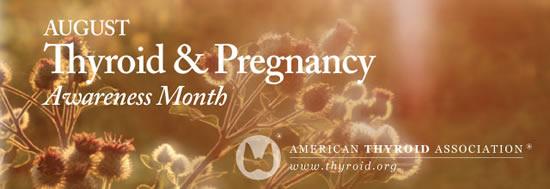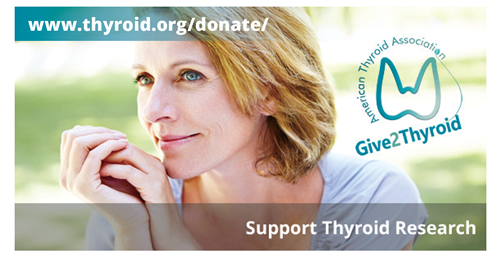Clinical Thyroidology for the Public summarizes selected research studies discussed in the previous month’s issue of Clinical Thyroidology, an official publication of the American Thyroid Association. Editor-in-chief, Alan Farwell, MD, FACE
Volume 12 Issue 8
Available in pdf format for saving and printing and Web page format for viewing online
PDF Format for Saving and Printing
Clinical Thyroidology for the Public Volume 12 Issue 8 (PDF file, 6.76 MB)
TABLE OF CONTENTS – Web Format
HYPERTHYROIDISM Does radioactive iodine therapy for Graves’ disease cause cancer?
Radioactive iodine therapy has been available as a treatment option for patients with hyperthyroidism since the 1940s. The CTTFS has been following >35,000 patients with hyperthyroidism who were treated with radioactive iodine therapy between 1946 and 1964 and previously reported no increased risk of dying of cancer in this group. In the current study, the authors extend analysis of the previous CTTFS by including an additional 24+ years of patient follow-up in order to assess the associations between radioactive iodine therapy for the treatment of hyperthyroidism and overall death from cancer.
Kitahara C et al 2019 Association of radioactive iodine treatment with cancer mortality in patients with hyperthyroidism. JAMA Intern Med. Epub 2019 Jul 1. PMID: 31260066.
(PDF File for saving and printing, 852 KB)
THYROID CANCER Is obesity a risk factor for thyroid cancer?
Prior studies have shown that obesity is a risk factor for several cancers and may contribute to the risk of developing thyroid cancer. Obesity is one aspect of metabolic health, which also includes blood sugar, lipids and blood pressure. This study examined the effect of obesity on the incidence of thyroid cancer according to metabolic health status.
Kwon H et al 2019 Metabolic Obesity Phenotypes and Thyroid Cancer Risk: A Cohort Study. Thyroid 29:349-358.
(PDF File for saving and printing, 381 KB)
HYPOTHYROIDISM Levothyroxine dose may change after weight loss surgery in patients with hypothyroidism
Bariatric surgery is becoming more common and is the most effective treatment for severely obese individuals. Since levothyroxine is absorbed in the small intestine, the amount of levothyroxine required may change after bariatric surgery in patients who have hypothyroidism. This study was done to compare changes in levothyroxine dose in the first 2 years after the 2 most common types of bariatric surgery
Julià H et al. 2019 Changes in Thyroid Replacement Therapy after Bariatric Surgery: Differences between Laparoscopic Rouxen- Y Gastric Bypass and laparoscopic Sleeve Gastrectomy. Obes Surg doi. 10.1007/s11695-019-03890-9 [Epub ahead of print]
(PDF File for saving and printing, 276 KB)
THYROID CANCER Calcitonin normalizes within 1 week after surgery in most patients with node-negative medullary thyroid cancer
Medullary thyroid cancer arises from the C-cells in the thyroid that produce the hormone calcitonin. After surgery, calcitonin can be used as a cancer marker to help determine if any cancer cells are remaining. This study was designed to check how long it takes calcitonin to normalize after successful medullary thyroid cancer surgery.
Machens A et al 2019 Time to calcitonin normalization after surgery for node-negative and node-positive medullary thyroid cancer. Br J Surg 106:412-418. Epub 2019 Feb 6. PMID: 30725475.
(PDF File for saving and printing, 562 KB)
THYROID CANCER Thyroid cancer that no longer responds to radioactive iodine may become sensitive after starting anti-cancer drugs
While radioactive iodine therapy is usually very effective, advanced thyroid cancer can become resistant to radioactive iodine. A few, small studies have showed that targeted therapy with drugs that inhibit BRAF and MEK may restore the ability of the thyroid cancer cells to take up radioactive iodine. This study evaluated whether the radioactive iodine sensitivity is restored in patients with advanced, radioactive iodine resistant thyroid cancer treated with either a single drug or a combination of BRAF and/or MEC inhibitors.
Jaber T et al 2018 Targeted therapy in advanced thyroid cancer to resensitize tumors to radioactive iodine. J Clin Endocrinol Metab 103:3698−3705. PMID: 30032208.
(PDF File for saving and printing, 281 KB)
THYROID CANCER An evaluation of the molecular marker tests for thyroid cancer
Measuring molecular markers, which are gene mutations that are seen in cancer, allows the identification of indeterminate biopsies as benign and, thus, to avoid surgery. There are 3 such companies offering measurement of molecular markers in thyroid biopsy specimens. The 3 papers reviewed report the performance of these assays in evaluating Bethesda III and IV indeterminate biopsies.
Steward DL et al Performance of a multigene genomic classifier in thyroid nodules with indeterminate cytology: a prospective blinded multicenter study. JAMA Oncol. Epub 2018 Nov 8. PMID: 30419129.
(PDF File for saving and printing, 290 KB)





